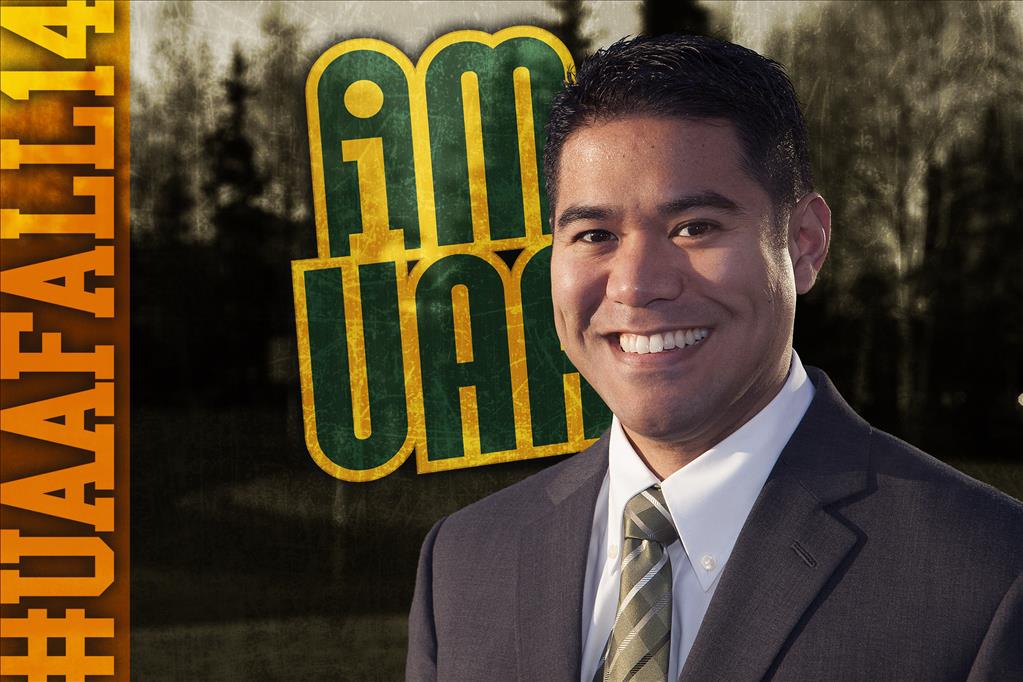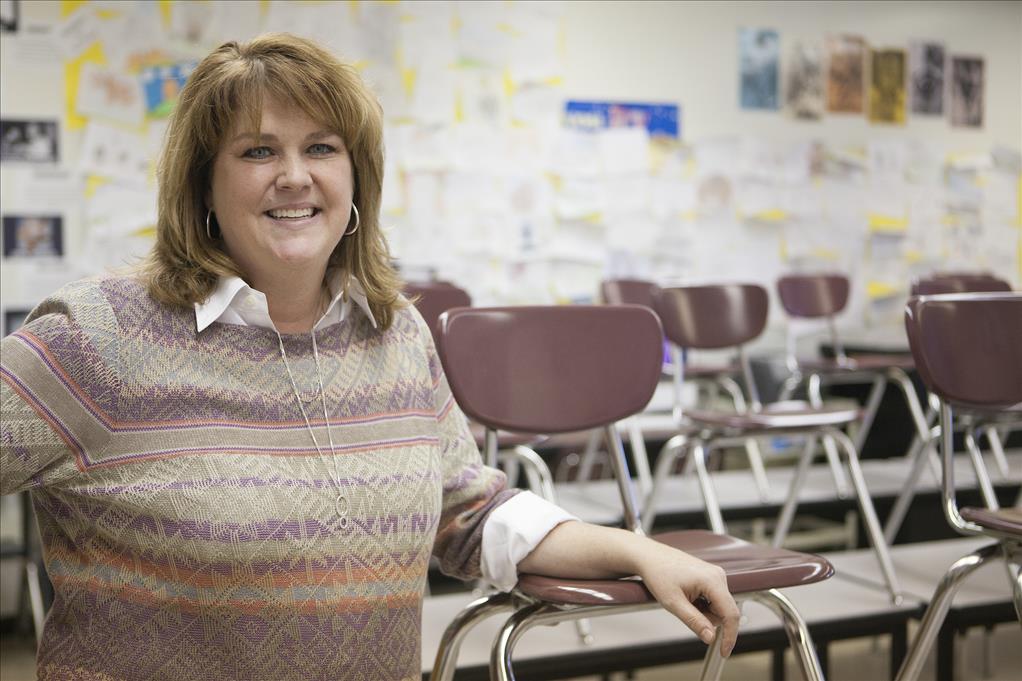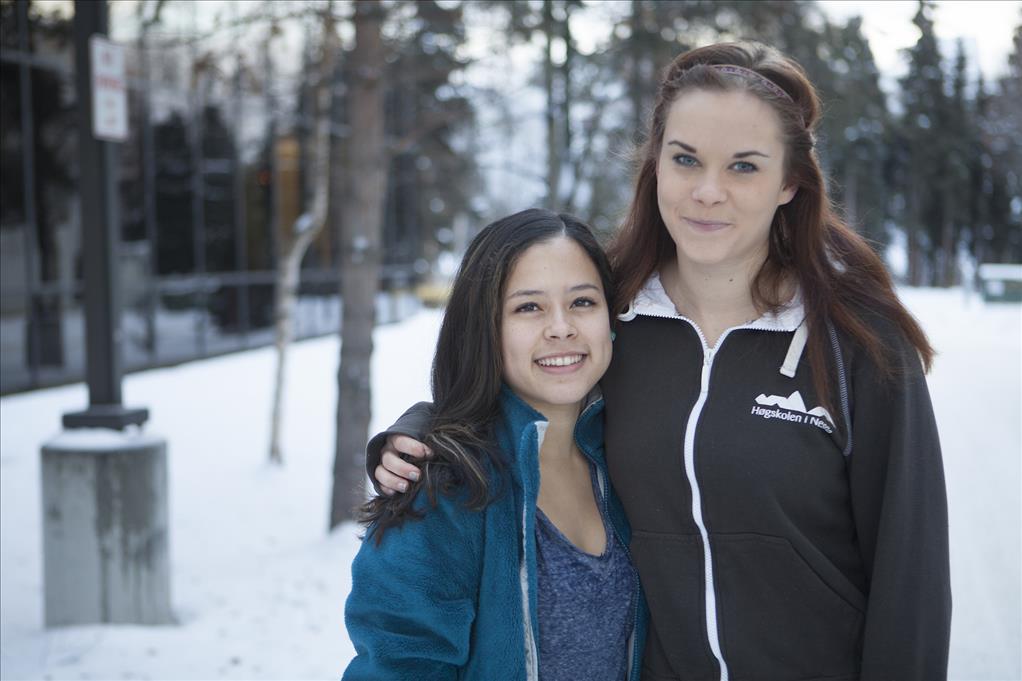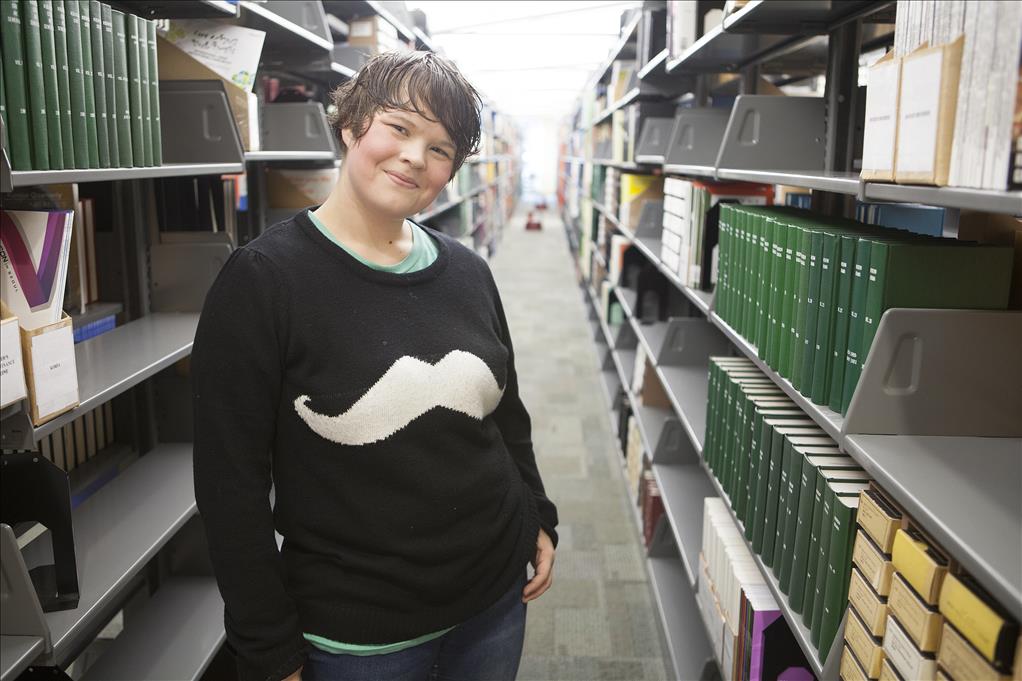Finding fulfillment in helping a forgotten people
by Tracy Kalytiak |
Jason Hahn was tending bar part time at the Petroleum Club of Anchorage when he served a drink to a geologist he knew who had just returned from drilling water wells for South Sudan villagers.
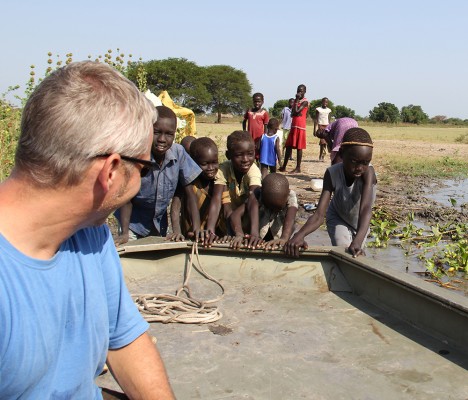
Jason Hahn, program director for the Alaska Sudan Medical Project, looks at children playing with a boat in Old Fangak, South Sudan. (Photo courtesy of ASMP)
"[We were] going through the normal banter when he told me about the Alaska Sudan Medical Project," said Hahn, who graduated in 1998 with a UAA bachelor's degree in biological sciences and is now working on a Master of Public Health degree. "I had no idea he did this and was intrigued. He told me I should get involved. I told him I would accept his challenge. I'm not sure he believed me."
The happenstance encounter transformed Hahn's life, igniting a passion that ricocheted his life nearly 8,000 miles from that white-linen-tablecloth retreat to the sticks-mud-and-cow dung huts of Old Fangak, a village tucked in a crook of the White Nile.
Hahn, at the time, was a veteran of public service who had accomplished far more than just pouring Macallan for Petroleum Club members.
For more than a decade, Hahn had helped homeless teens at Covenant House Alaska receive education, training and jobs.
"I was looking at a potential teaching career," he said. "After seeing the need and the effect you can have by giving the right opportunities to at-risk teens, I stuck with my 'entry' job for 12 years. In the meantime, I traveled extensively while doing short-term volunteer projects overseas."
Hahn conducted teen workshops in Sweden, taught English in Ecuador and Malaysia, volunteered with indigenous communities in Peru.
Hahn also visited Africa-traveling to Egypt-but didn't know much about South Sudan. He checked out the Alaska Sudan Medical Project (ASMP) website and attended a board meeting where other prospective volunteers had been invited.
"I had been on the fence at that point, but once I met that committed group of volunteers, I was hooked," he said.
Hahn traveled to Old Fangak in 2010. Today, he's ASMP's program director.
"It is hot-that is honestly the first thing you notice," Hahn said. "The village is on the Nile River, so it is actually peaceful and quite beautiful, in a stark way. You notice the smells, also-strong ones that pass through from the fish market, from open waste, from cattle, from bare humanity. First impressions are that it is very basic, very primitive. But the people are warm, open, friendly and quick to smile."
Growing a healthier community
Dr. Jack Hickel, an Alaskan, launched ASMP after visiting Old Fangak at the invitation of Dr. Jill Seaman, a WWAMI graduate, Doctors Without Borders physician, MacArthur Fellow and Bethel family medicine doctor who has spent more than 25 years treating patients in volatile Sudan. Her clinic: an old colonial-era brick structure that was falling apart.
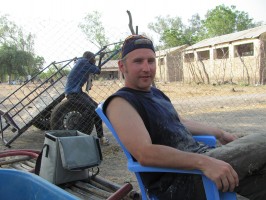
Jason Hahn, a UAA alumnus, helps drills water wells for villagers in South Sudan in his work as program director for the Alaska Sudan Medical Project. Here, he takes a break. (Photo courtesy of ASMP)
About 5,000 people live in Old Fangak, with another 10,000 in surrounding communities. Recent conflicts in South Sudan haven't affected Old Fangak, so refugees arriving there have about doubled its population and increased the urgency of ASMP's efforts to bring clean water and food there.
There is no electricity, no running water, no predictable source of food in that remote area of South Sudan. Only aircraft and boats can deliver building materials and supplies. There are few roads because of Old Fangak's location in the Sudd, a massive swamp. Soil bakes hard during the dry part of the year and softens into deep mud during rainy months.
Seaman has treated thousands of people, with the main health challenges being malaria, tuberculosis and kala-azar, a disease spread by leishmania parasites that infects humans through bites from female sandflies and attacks the immune system. Left untreated, kala-azar is almost always fatal.
After visiting Seaman, Hickel returned to Alaska and recruited a team that became ASMP. It set four goals:
• Building medical clinics and infrastructure.
• Developing clean water sources.
• Supporting farmers in creating a reliable food supply.
• Providing training to locals in growing a self-sustaining, healthy community.
ASMP finished building a new solar-powered primary care clinic in Old Fangak last year-a five-year effort hampered by a fire last year that destroyed medical equipment, supplies and a year's worth of expensive kala-azar treatment. And, volunteers have drilled water wells.
"The people need basic things like clean water and more food security," Hahn said.
'A resurgence is happening'
Before the water wells, Hahn said, villagers drank from the Nile River or other dirty sources of water such as mud puddles, putting them at a high risk of diseases like bilharzia and other microbes and parasites that cause diarrhea-the number-one cause of death in children under 5 in South Sudan.
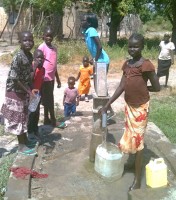
Children in Old Fangak, South Sudan, fill containers with clean water from one of the wells Alaska Sudan Medical Project volunteers drilled. (Photo courtesy of ASMP)
Along with continuing to bring water and expand agriculture, ASMP volunteers are continuing to improve sanitation by constructing latrines, and enhancing hygiene through hand-washing stations.
The next challenges ahead: building a center that treats tuberculosis and other infectious diseases, because South Sudan has one of the highest rates of TB in the world.
The ASMP volunteers are also focusing efforts on expanding agriculture, which Hahn describes as a huge untapped resource.
People in Old Fangak eat staples-sorghum and maize-but there is not much else on the market, he said.
"[Agriculture] has been lost in the perpetual wars of the Sudans over the last 40 years," he said. "A resurgence is happening, and we are helping in those efforts. As our local agriculture program has grown, we are seeing more tomatoes, onions, okra, eggplant, bananas available for the locals to eat. They also do some fishing to supplement their diet, but in general there is not enough food to go around. This area of the Nile River is immensely fertile. They just need seeds, basic tools and training to get it going. It is taking off like wildfire and is self-perpetuating."
A strange paradox
People living in Old Fangak are culturally very different from Americans, Hahn says.
"Most of their culture revolves around the role of cattle, since they are a historically nomadic pastoral people," he said. "Women receive a dowry of 50 cattle for marriage, for example. That is still practiced today. Women have many roles: caretakers, water carriers, cooks. Men often go off to tend cattle. In Old Fangak, many people-men and women-work in the local clinic run by Dr. Jill. Family is a huge part of everything, but that is true many places. They are the same that way. They want to have kids, support their families and live normal lives."
Hahn says Old Fangak is striking.
"Poverty isn't really the word: it is more there is just a complete lack of resources-water, food, education, basic tools and necessities," he said. "Yet it is not a land of total despair. The people live their basic lives on a day-to-day basis and are thankful for what they have."
Hahn says the people he's met there in Old Fangak seem happier than many people he's encountered here in the U.S.
"It is a strange paradox," he said. "They continually celebrate daily victories: a harvest, a friend returning home, a baby being born. And the fact we are working with them to bring clean water, agriculture and health care, it really gives them hope-tangible hope that they are not forgotten and they have a chance for a future without sickness and needless deaths."
ASMP volunteers sleep in tents next to a small wood-and-mud "compound"-the largest hut in Old Fangak-where they store supplies and cook food they bring in. "We eat a lot of rice, pasta and canned food, and get very creative with spices."
Hahn says he's heard culture shock happens in reverse.
"I agree 100 percent," he said. "The shocking thing is not visiting a place like Old Fangak. It is returning home. Going into a Fred Meyer is overwhelming. The amount of material goods at our disposal compared to the majority of the world is shocking. It is almost comically exaggerated."
A woman named Nyapuka works for ASMP, bringing water, cooking and cleaning. She recently gave birth.
"She named her baby 'Alaska,'" Hahn said. "I think it is symbolic of the gratitude and appreciation for our work. It is what keeps me working in this remote, faraway place among a forgotten people. They may not have much, but the few things we bring that give them hope for their children are worth more than words can describe."
Want to get involved? ASMP needs volunteers and financial support for its agricultural, health, water and training projects.
Written by Tracy Kalytiak, UAA Office of University Advancement
 "Finding fulfillment in helping a forgotten people" is licensed under a Creative Commons Attribution-NonCommercial 4.0 International License.
"Finding fulfillment in helping a forgotten people" is licensed under a Creative Commons Attribution-NonCommercial 4.0 International License.










